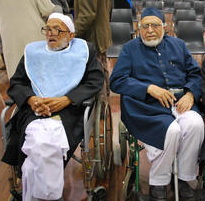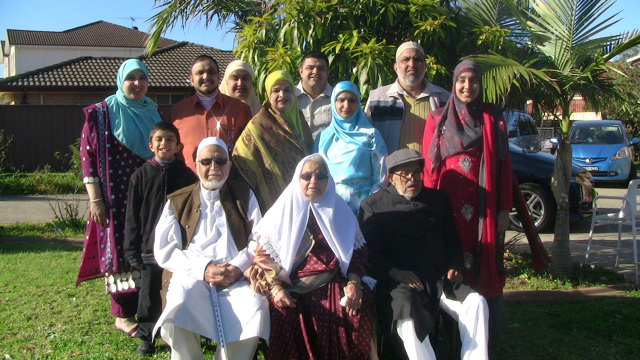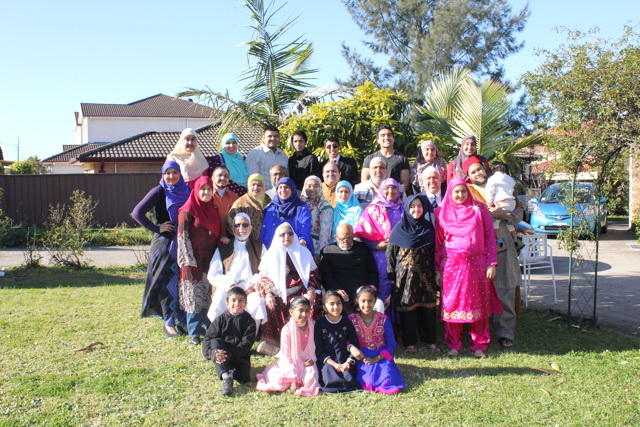
Sada-e-Watan Sydney ™
sadaewatan@gmail.com
A tribute to Ali
Hussain Siddiqui written by Zia Ahmad

Ali Hussain Siddiqui & Dr Qazi Ashfaq
Janab Ali Hussain Siddiqui Sb (Brother in law of Dr Qazi Ashfaq Ahmad and father of Shahab Siddiqui, Abu Fateh, Shujaat Siddiqui) passed away on the morning of Friday,29th July 2011 at the Bankstown Hospital Sydney. His Namaz e Janazh was held at Lakemba Mosque and funeral was held at Liverpool cemetery.Dr. Qazi Ashfaq’s elder Son Zia Ahmad sends Sada-e-Watan this Article of Tribute.
A
tribute to Ali Hussain Siddiqui (my Late Grandfather) written by Zia Ahmad
Mr Ali Hussain Siddiqui
3 January 1922- Friday 29 July 2011
Mr Ali Hussain
Siddiqui was born on 3 January 1922 in the village of Anwayan, town of Bilthra
Road, District Ballia located in the eastern part of the state of Uttar Pradesh,
India. He was generally considered to be four years older than his officially
recorded age.
Education &
Profession:
He completed his High School from George Islamia College, Gorakhpur in 1940;
Intermediate in 1943, BSc in 1945 and MSc in 1949 in Zoology specialising in
Entomology, all from the Aligarh Muslim University. He underwent training with
the Indian Air Training Corps and obtained a certificate of proficiency in 1944.
He also obtained a training Certificate of Achievement in 1961 after spending a
year at the Agricultural & Mechanical University and Rice Pasture Experimental
Station of Texas, USA.
He worked as a lecturer of Biology at the George Islamia college, Gorakhpur from
1949 to 1950 and after migrating to East Pakistan held various positions with
the Department of Plant Protection, Government of Pakistan as Assistant
Entomologist (1951-57), Assistant Aerial Pest Control Officer (1957-71),
Assistant Director, Plant Protection (1962) and after migrating to West
Pakistan, Deputy Research Entomologist (1973-1981) with the National
Agricultural Research Council (NARC), Government of Pakistan.
He specialised in plant protection and pest control in crops, trial of
effectiveness of different insecticides and spray systems both in the laboratory
as well as in the field, aerial spraying of large areas of farmlands both in
East as well as West Pakistan and published five research papers in scientific
journals.
Family:
The Siddiqui family trace their origins from the first Caliph Abu Bakar Siddiq
(RA), one of whose descendants Sheikh Azeemullah Siddiqui popularly known
asSheikh Paharh (Sheikh Mount, due to his extra ordinary height) migrated six
hundred years ago from Hijaz, Arabia to India and settled in Seewan (borders of
Bihar and UP) in 1361 CE (762 Hijri) during the time of Turkish Sultanate of
Feeroz Shah Tughluc. The History and Shajrah (Family Tree) of this family from
1361 to 2005 has been documented accurately in the form of a book Tareekhul
Harihans mae Khandani Shajra written by Chaudhury Sheikh Mohammad Zaki Siddiqui
(1945) and finally researched, updated and published by Mashkoor Ahmad Siddiqui
(2005), Delhi.
Ali Hussain was born in a Zamindar (feudal landlord) extended Siddiqui family of
Harihans. His great grandfather settled in Anwayan building a huge extended
family housing complex with reception lounges (Kachahri), school (madrassa),
family mosque, living quarters with internal courtyards and gardens, Hata,
stables complex housing elephants, horses and other domestic animals and
external servant quarters. The family managed their vast agricultural lands from
this housing complex obtaining lagan, taxes from peasants who worked on leased
lands from the family.
He was born in British India and spent his younger years during the time when
rapid changes were taking place in society with the breakdown of the feudal
system in India, end of the British Raj, fight for Independence and partition of
the country into independent states of India and Pakistan (purani deewar gir
rahi thi aur nai deewar uth rahi thi).
He was the second eldest in a family of two sons and four daughters having lost
their mother at an early age and father not fully capable of taking care of the
family affairs. His eldest brother, although disable, but with a sharp mind
managed the affairs of the Zamindari of the family lands and income derived from
taxes.
Among the Zamindar family in those days generally, seeking job (nokri) with the
British government was frowned upon and therefore higher education was not
encouraged. Ali Hussain realised that the Zamindari system was breaking down
fast and was therefore not interested in the traditional family occupation. He
was very keen to obtain higher education (aala taaleem), not just for himself
but upcoming younger generation of his large extended family in Anwayan.
Marriage:
After completing High school from Gorakhpur, he moved to Aligarh Muslim
University and spent the next nine years obtaining higher education. Many times
due to delayed financial support from the family, he had to do tuition in order
to support himself during his quest for education. He encouraged and managed to
get a number of his cousins to seek higher education at AMU and other
institutions of excellence in India and abroad.
His eldest sister Khurshedi got married within the larger extended family of
Harihans and moved to Gorakhpur. He met a bright young man Qazi Ashfaq Ahmad
completing engineering at AMU and after developing mutual friendship managed to
arrange marriages on a reciprocal basis (gulawat) between his second sister
Jamal Ara with Ashfaq while himself marrying Ashfaq's elder sister Akhtar Bano
in 1949. Ashfaq Ahmad and Akhtar Bano, brother and sister had become orphans
from a very early age and grew up with their grandfather and aunty (Phoophi) in
Mohammadabad Gohna. They also belonged to Sheikhain family of Farooquis,
Siddiquis and Abbasis hailing from Ghazipoor, UP involved in legal profession
ofqazi in Mughal empire and magistrates and lawyers during the British Raj.
Pakistan:
In 1951 Ali Hussain migrated to East Pakistan (now Bangladesh) joining the
department of Plant Protection in Dacca (Dhaka). His eldest son Shahab was born
in India and a second son was born soon after his arrival. Unfortunately due to
an accident, his younger son got burns from hot milk and died. Akhtar Bano, a
sensitive and intelligent woman could not bear this loss and lost her mind
around 1954. This was a great time of tribulation and trial for Ali Hussain and
the entire family being in a new country and with no extended family support. He
took Akhtar Bano to many premier institution of mental health, both in Pakistan
and India for treatment, but she did not become better till the early seventies.
Ali Hussain was greatly helped during this long ordeal of his family situation
by a Bengali woman who looked after the household as Booa (governess). He had
three more children Mehar Jahan (1956), Abul Fateh (1960) and Shujaat Ali (1964)
and Booa, sacrificed her own life and ambitions and looked after Ali Hussain,
Akhtar Bano and all the four kids in the household feeding them and training
them in their life skills. When Ali Hussain moved to Karachi, West Pakistan at
the beginning of 1971, Booa left her country, her people, her culture and kept
looking after the family in Karachi. Ali Hussain, Akhtar Bano and their four
kids developed great respect and love for this lady and were ever after indebted
to her. Finally in 1972 while in Karachi, a doctor prescribed some medicine for
Akhtar Bano that miraculously worked and she became almost 90% normal.
Australia:
Meanwhile Ashfaq Ahmad migrated to Sydney, Australia in 1971 and decided to burn
his boats and call this great country, home. He was always concerned about his
only sister's family and between him and Ali Hussain they proposed another
marriage on a reciprocal basis (Gulawat) where Shahab will get married to Fauzia,
his eldest daughter while His eldest son Zia will get married to Ali Hussain's
daughter Mehar. Their children agreed to this arrangement and the weddings were
organised in 1975 in Sydney where Ali Hussain and Akhtar Bano visited Sydney for
a few months.
In 1981 Ali Hussain's entire family migrated to Australia. They tried to obtain
a visa for Booa, but the application was unsuccessful. She did visit Australia
and stayed with the family for a few months and got her health checked. Finally
she got married to a gentleman in Lahore and spend her life happily in the
household till she passed away in 1998. Many in the Australian family paid her a
visit from time to time in Lahore.
The Ahmad and the Siddiqui extended families flourished in Australia obtaining
education, getting jobs, establishing businesses, buying homes and properties
and multiplying into a clan of more than fifty people. Above all they
established close family relationships under the guidance of the first
generation of elders, meeting together on a weekly basis and sharing the
happiness as well as the sorrows together. They participated in many community
organisations and established institutions for the promotion of Islam, Muslims,
Urdu language, Aligarh movement etc. Ali Hussain was very passionate in serving
the AMU Alumni of Australia, attended its functions and even made halva with his
own hands to sell and raise funds for the AMU scholarship project. In his old
age Ali Hussain felt very much satisfied with his family's achievements and
especially proud of his children's business ventures and higher education (aala
taleem) of his only daughter and that of the third generation. His training,
guidance, blessings and above all duas were behind this success story of the
extended family.
Ali Hussain Siddiqui lived happily mainly with his two younger sons in the
Condell Park home, occasionally spending short periods in his eldest son's place
in Box Hill and occasionally at Dar-ul-Islam in Bonnyrigg with his daughter. He
was looked after very well and greatly cared for by his daughter-in-laws as well
as his granddaughters. He regularly attended the weekly study circle Usrah at
Darulislam as well as various family and community functions till his last days.
Akhtar Bano passed away in 2005 after a short illness and was buried at
Liverpool Cemetery. Ali Hussain went to hospital two weeks before his death
where many members of the extended family, both second and third generation
spent time with him on a rostered basis, looking after him and strengthening
their bonds with him. Finally he passed away around 6 am on Friday 29 July 2011
at Bankstown Hospital. His janaza prayer was held at Juma in the Lakemba mosque
led by Sheikh Tajuddin AlHilaly and joined by his large extended family, friends
and hundreds of Muslims and he was buried that afternoon at the Liverpool
Cemetery. Inna Lillahi wa inna alaihi rajeoon.
Ali Hussain Siddiqui was blessed with a long life of almost 93 years, full of
tribulations and trials in his early and middle age, but spend his old age
happily served, loved and surrounded by his close family, lovely friends,
dedicated carers, active community and living in a great country. May Allah
grant him jannah in the hereafter and make us able to cherish his memories and
keep remembering him in our duas, Aameen.
(Tribute written by his
nephew and the only son-in-law, Zia Ahmad)


